Staff Reporter
European Central Bank (ECB) officials issued a stark warning on Monday about the euro zone’s economic outlook, highlighting the potential impact of a trade war with the United States.
They cautioned that ongoing tariffs, uncertainty, and declining confidence could undermine the region’s fragile recovery.
Recent estimates suggest the euro zone economy grew by a modest 0.2% in the first quarter, but this recovery is now seen as stalling, with risks leaning toward negative outcomes.
“Risks have intensified amid significant uncertainty, mainly related to trade,” ECB Vice President Luis de Guindos told European lawmakers during a hearing.
He noted that exporters are encountering new obstacles, which could dampen business investment and lead consumers to exercise greater caution.
At a financial seminar, Finnish central bank chief Olli Rehn remarked that many of the negative risks previously identified by the ECB have now come to fruition.
“The trade war and the considerable uncertainty it brings are hindering growth,” Rehn stated. “Some of the downside risks anticipated in the ECB’s March projections have already materialized, further weakening the growth outlook.”
While neither official called for immediate policy easing, Rehn indicated that interest rates could be lowered if inflation falls below the ECB’s target.
Both he and de Guindos acknowledged that a trade war could suppress prices and slow inflation, which is currently approaching the ECB’s 2% target.
Trade barriers are not only slowing growth but have also led to lower energy prices and an increased value of the euro, further pressuring inflation.
Additionally, there is concern that China might redirect products excluded from the U.S. market into the euro area, potentially driving inflation down even further.
“I believe it is reasonable to assume there are downside risks to the inflation outlook in the ECB’s March projections,” Rehn said. Meanwhile, de Guindos offered a more tempered perspective on inflation, suggesting it is likely to remain around the bank’s 2% target. This represents a subtle shift from the bank’s earlier stance, which anticipated that disinflation was on track and price growth would meet the ECB’s target later this year.

